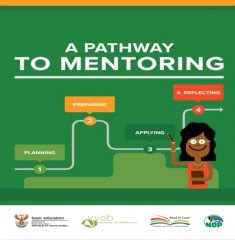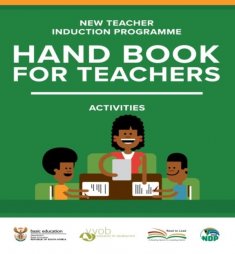
DBE launches a field test of the New Teacher Induction (NTI) programme
In 2020, the Department of Basic Education (DBE) launched a field test of a New Teacher Induction (NTI) programme. “Teacher Induction in South Africa has happened in different ways and in different schools, but research tells us that it was very uncoordinated”, explains Mr. Gerrit Coetzee, director for Initial Teacher Education with the Department of Basic Education and the driving force behind the initiative. The process was initiated by the DBE, set up in collaboration with the South African Council for Educators (SACE) and supported by VVOB – education for development.
Legal context
Since 2005, teacher induction has been recognised as a priority by the South African Government. The Department of Education has supported teacher induction through a number of policies and plans (e.g. A National Framework for Teacher Education in South Africa, DoE, 2005). A 2005 DoE report (Teachers for the Future: Meeting Teacher Shortages to Achieve Education for All, DoE, 2005b) stated that “every new teacher should be required to participate in a formal induction and/or mentoring programme for at least two years”. The ISPFTED (Integrated Strategic Planning Framework for Teacher Education and Development, 2011-2025, DBE & DHET, 2009) called for teacher induction programmes which include mentoring in order to stabilise the teaching profession and enable teachers to become competent professionals.
In 2017, DBE published and disseminated New Teacher Induction: Guidelines for the Orientation Programme. These orientation booklets contain a concrete overview of the South African schooling system, a list of relevant policy documents, the roles and responsibilities of key officials for school-based orientation and a range of recommended orientation topics.
National induction framework through a consultative process
The national framework for induction of teachers was developed in 2018-2019 by the DBE in a consultative way with working groups and two round tables. The process was facilitated by JET Education Services, commissioned by VVOB. The key components are mentorship, expert training, reflection through a portfolio of evidence and professional learning communities (PLCs). Literature shows that PLCs can be used within or between schools to support both mentors and mentees in the induction process. They support the social aspects of induction, as well as providing platforms for further training, reflection, peer support and peer learning.
The induction process
Based on this national framework, DBE developed the induction materials for teachers. The process was facilitated by Dr Tanya Bekker from the Witwatersrand University, commissioned by VVOB. School-based mentors are crucial components of the induction, providing the single strongest influence on job satisfaction and retention (CDE, 2016). Therefore, DBE developed appropriate mentor-training materials in collaboration with a team from North-West University led by Prof. Carisma Nel (commissioned by VVOB).
The materials that were developed for the NTI field test are open educational resources (OER) and can be used by all educators. At the moment of writing, they can be accessed via our publications and on FundaOER, a platform for open educational resources in South Africa:
Mentor training materials. District officials will use these materials to train school-based mentors:
- A pathway to mentoring, explaining the importance and approach to mentoring;
- Mentor training manual (with accompanying PowerPoint presentation) to assist mentors to support the teachers.


Induction materials for teachers. The manual is split into three parts:
- Background of 7 induction themes, based on the professional teaching standards;
- Concrete activities related to the 7 themes;
- Reflections on activities and themes, which will serve as a portfolio of evidence.
Field test before national roll-out
With all materials in place, the field test is taking place in one district each of the KwaZulu-Natal, Free State and North West provinces. “This field test has to happen in real life”, states Mr Coetzee. “We want to avoid an artificial environment. Field-testing will give us the information we need to finalise the induction programme for the national roll-out”, Mr Coetzee concludes. VVOB and Benita Williams Evaluation Consultants (commissioned by VVOB) are collaborating to identify supporting and inhibiting factors to the induction field test. The evaluation of the field test will inform the design of the national roll-out of the programme.
Continuing professional teacher development
“The programme ties in nicely with the work that SACE is doing”, explains Mr. Coetzee. The purpose of the NTI is to strengthen the professional development of newly qualified teachers, supporting teachers in the transition from their teacher training at university to actual teaching and facing contextual challenges in schools. SACE’s teacher professionalization pathway comprises nine stages, of which induction is the fourth step, leading to continuing professional teacher development (CPTD).
Online learning
The Covid-19 outbreak has implications on the implementation of the field test. The original plan was to organise face-to-face meetings with district officials (as trainers of mentors), mentors and educators (school leaders and teachers). However, to support the training of district officials and mentors, North-West University (NWU) had incorporated the use of Google Classroom, which already proved very useful in the first distance training of trainers of mentors. “This platform could become a good practice, even if the field test will be scaled”, explains Loran Pieck, Education Advisor for VVOB.
Mr Gerrit Coetzee welcomed participants in the programme during the field-testing orientation meeting. In his address, he highlights the key aspects like the NTI progress map, the teacher professionalisation pathway, the 7 main themes of the induction programme, in line with SACE’s draft professional teaching standards, and the materials for mentors and teachers. Mr Coetzee’s introduction is available online in a series of four videos on YouTube and is also part of the Google-classroom online training.
Sources for this article
A National Framework for Teacher Education in South Africa (DoE, 2005a)
Teachers for the Future: Meeting Teacher Shortages to Achieve Education for All (DoE, 2005b)
ISPFTED: Integrated Strategic Planning Framework for Teacher Education and Development, 2011-2025 (DBE & DHET, 2009)
New Teacher Induction: Guidelines for the Orientation Programme (DBE, October 2017)




